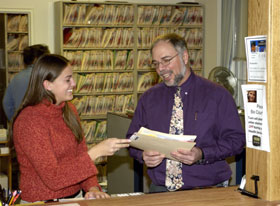|
This is an archived article.
For the latest news, go to the Advance Homepage
For more archives, go to the Advance Archive/Search Page. |
||
|
We Make A Difference In Students' Lives,
Michael Kurland was advised not to take the job as head of the UConn Health Services. On the fast track to becoming a hospital CEO, he was told the University job would derail his career and bore him daily. Not so, he says 15 years after ignoring the advice and accepting the position. "I love this job. It is totally different every day, and very fulfilling," Kurland says. "It uses every bit of my background and presents challenges every day."
Some of those challenges over the years have included dealing with AIDS, which 15 years ago terrified colleges across the country; meningitis, which threatened to close the campus in 1993 after three students became ill with the same strain of it; and SARS, which just last year became a concern after a student returned from a trip and was diagnosed with a possible case. There are also business challenges caused by changes in federal regulations, privacy laws, immunization regulations (such as the state law put into effect in 2002 that all students get vaccinated for meningitis if they live on campus), and accreditation and licensing standards.
Improving Students' Lives
To do that, he says, Health Services often works with other programs on campus to come up with preventative measures and support mechanisms for students so they can access a continuum of services. "We might work with residence hall staff and others in student affairs, psychologists, social workers, and even the medical community to solve a problem," Kurland says. This is possible, he says, because at UConn, Health Services is part of the Division of Student Affairs and is therefore focused on students. "At some other colleges, the health service is part of the business office, for example. Here, we are woven into the fiber of student affairs and that has made us effective in working closely with various offices on campus." Some of the issues Kurland and his staff cope with are perennial: student drinking, sexually transmitted diseases, gaining the 'freshman 15' pounds, and sports injuries, among others. But increasingly, the problem for many students is coping with a lot of pressure. "In the next five years, I predict that mental health and stress issues will become extremely critical for students," he says. "For one thing, more students are coming to college with psychiatric diagnoses or on medications. For another, students are under more pressure. Standards are higher, college is more stressful, and the family structure is less of a support system for students, who have to be much more independent at increasingly younger ages," says Kurland, the father of two college-aged children.
A Matter of Coordination
"Our goal is to work with whatever offices we can, to allow the student to remain on campus and have a successful academic career," he says. Health Services also works with the Environmental Health and Safety Department and the UConn police and fire departments to provide the services required for the safety of the campus. And it often coordinates with towns in the area on health issues. Currently, Kurland is working with local towns to develop bioterrorism response plans, such as plans for a smallpox mass vaccination clinic. His job also frequently requires him to work closely with the state Department of Public Health. It was that agency that helped UConn cope with the student meningitis crisis in 1993 by vaccinating nearly the entire student population, as well as handling the case last year that turned out not to be SARS. Kurland is not a physician. A psychology major who has a graduate degree in public health and health services management, he was trained as a hospital administrator and had a variety of jobs before coming to UConn. He has worked both in rural Tennessee and at inner city hospitals in Yonkers, N.Y., and Paterson, N.J. One day, he recalls, "when I was under intense stress, someone called about the job at UConn and it changed my life forever."
A Holistic Approach
"We have different entry points for our patients," he says. "Some students call our advice nurses, who work 24 hours a day. Others come in and take their temperature and do a self-diagnosis before working with a staff member. Others make appointments to see nurse practitioners or physicians. Some of these appointments would take months to get in other places. We are right there for the students, and at low cost." Kurland says one of his next challenges will be working with construction experts on a new facility. The new building will be very different from the current one, which was renovated in 1989 to accommodate a large inpatient unit. Students often stayed overnight at that time, because antibiotics didn't work as quickly as they do now. The new facility, he says, will emphasize state-of-the-art clinical space, with waiting rooms, and more, but smaller examination rooms to make the best use of doctors' and nurse practitioners' time. "We're very excited about the new building," says Kurland. "It will help us serve the students better, and that's what we're all about." |

